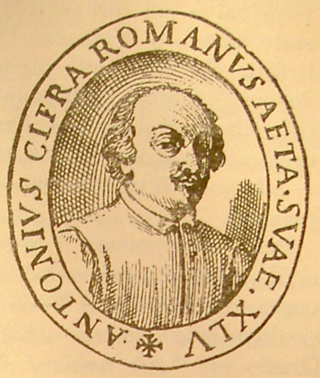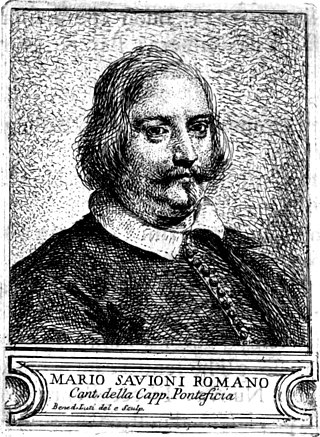Related Research Articles

Francesco Cavalli was a Venetian composer, organist and singer of the early Baroque period. He succeeded his teacher Claudio Monteverdi as the dominant and leading opera composer of the mid 17th-century. A central figure of Venetian musical life, Cavalli wrote more than forty operas, almost all of which premiered in the city's theaters. His best known works include Ormindo (1644), Giasone (1649) and La Calisto (1651).
Andrea Gabrieli was an Italian composer and organist of the late Renaissance. The uncle of the somewhat more famous Giovanni Gabrieli, he was the first internationally renowned member of the Venetian School of composers, and was extremely influential in spreading the Venetian style in Italy as well as in Germany.
The year 1600 in music involved some significant events.

Domenico Allegri was an Italian composer and singer of the early Baroque Roman School. He was the second son of the Milanese coachman Costantino Allegri, who lived in Rome with his family, and was a younger brother of the more famous Gregorio Allegri. Costantino sent three sons, Gregorio, Domenico and Bartolomeo, to study music at San Luigi dei Francesi, under the maestro di capella Giovanni Bernardino Nanino, brother of Giovanni Maria Nanino. The little boy had as schoolmates his elder brother Gregorio and then Antonio Cifra, Domenico Massenzio and Paolo Agostini.

Antonio Cifra was an Italian composer of the Roman School of the Renaissance and early Baroque eras. He was one of the significant transitional figures between the Renaissance and Baroque styles, and produced music in both idioms.

Ruggiero Giovannelli was an Italian composer of the late Renaissance and early Baroque eras. He was a member of the Roman School, and succeeded Palestrina at St. Peter's.

Giovanni Maria Trabaci was an Italian composer and organist. He was a prolific composer, with some 300 surviving works preserved in more than 10 publications; he was especially important for his keyboard music.
Orazio Benevoli or Benevolo, was a Franco-Italian composer of large scaled polychoral sacred choral works of the mid-Baroque era.
The year 1603 in music involved some significant events.
Giovanni Domenico da Nola was an Italian composer and poet of the Renaissance.
Anton Gosswin, or Antoine Gosswin, also Jusswein, Jussonius, Cossiono, Gossovino, Josquinus, was a Flemish composer.
Tiburzio Massaino was an Italian composer.
Lorenzo Ratti was an Italian baroque composer originating from Perugia. His parents were Girolamo and Isapaola Ugolini. His uncle and teacher was Vincenzo Ugolini. He was the predecessor of Carissimi at the Collegium Germanicum and furthermore he was a teacher of Orazio Benevoli.

Mario Savioni was an Italian composer and a male alto of the Baroque era.
Stefano Fabri junior was the son of Stefano Fab(b)ri (1560–1609), who was the Kapellmeister of the Cappella Giulia. He was the pupil of Giovanni Bernardino Nanino. He was the music teacher of Francesco Beretta.
References
- ↑ Galliano Ciliberti. "UGOLINI, Vincenzo in "Dizionario Biografico"". www.treccani.it (in Italian). Retrieved 2020-05-30.